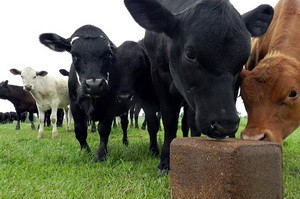Agricultural Salt
Less clearly recognized is the positive role of salt in horticulture. We think first in terms of how the Romans laid waste to conquered Carthage by plowing its fields with salt. Judiciously used, however, salt is a real boon as a fertilizer in certain applications.
Livestock, poultry and pets need salt for optimal health and development.
All domestic and wild animals need salt, just as humans, a fact well understood by the ancient Greeks as well as early hunters and nomads who hunted animals near salt springs or deposits. Animals have a more well defined appetite for sodium chloride than any other compound in nature except water. Ruminants have such a strong appetite for sodium that the exact location of their salt source is permanently imprinted into their memory which they can then return to when they become deficient. Salt is unique in that animals have a much greater appetite for the sodium and chloride in salt than for other minerals. Because most plants provide insufficient sodium for animal feeding and may lack adequate chloride content, salt supplementation is a critical part of a nutritionally balanced diet for animals. In addition, because animals have a definite appetite for salt, it can be used as a delivery mechanism to ensure adequate intake of less palatable nutrients and as a feed limiter.
 Feeding Animals & Plants
Feeding Animals & Plants
Livestock, poultry and pets need salt for optimal health and development.
All domestic and wild animals need salt, just as humans, a fact well understood by the ancient Greeks as well as early hunters and nomads who hunted animals near salt springs or deposits. Animals have a more well defined appetite for sodium chloride than any other compound in nature except water. Ruminants have such a strong appetite for sodium that the exact location of their salt source is permanently imprinted into their memory which they can then return to when they become deficient. Salt is unique in that animals have a much greater appetite for the sodium and chloride in salt than for other minerals. Because most plants provide insufficient sodium for animal feeding and may lack adequate chloride content, salt supplementation is a critical part of a nutritionally balanced diet for animals. In addition, because animals have a definite appetite for salt, it can be used as a delivery mechanism to ensure adequate intake of less palatable nutrients and as a feed limiter.
Less clearly recognized is the positive role of salt in horticulture. We think first in terms of how the Romans laid waste to conquered Carthage by plowing its fields with salt. Judiciously used, however, salt is a real boon as a fertilizer in certain applications.
Free-Choice Feeding
Either in loose form or in compressed blocks, trace mineral salt can be mixed with feed or fed free-choice to improve animal health and productivity.
Salt can also be used as a feed limiter. Forage with salt added increases the appetite, and animals having salt available generally gain twice as much weight as animals fed no sodium chloride. Use of salt stations in pasture helps to distribute grazing throughout the area.
Download Salt Trust Certificates…∇Download
Please contact salt trust and let our professional teamwork help you with your inquiry

